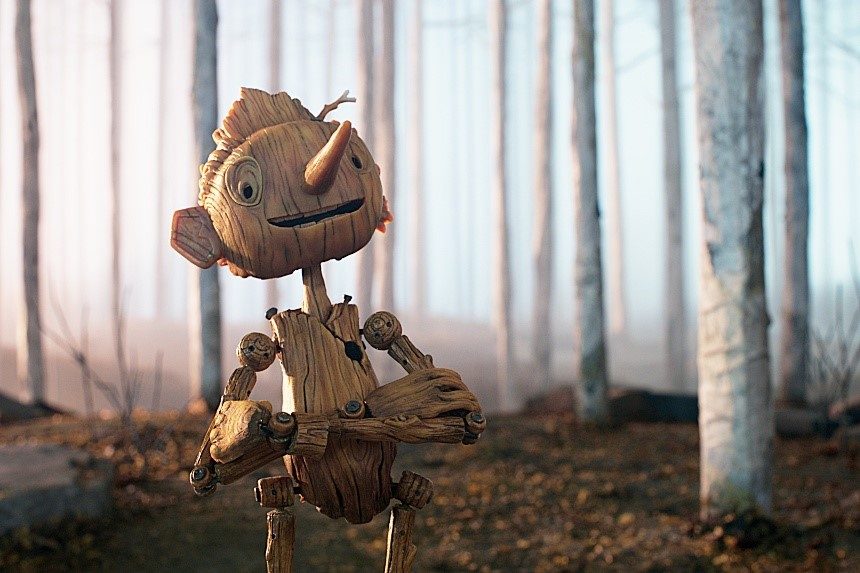Guillermo del Toro’s Pinocchio
⭐️ ⭐️ ⭐️⭐️
Run Time: 1 hour 57 minutes
Rating: PG
Stars: Gregory Mann, Ewan McGregor, Ron Perlman, Cate Blanchett, Tilda Swinton, John Turturro, Christoph Waltz
Writers: Guillermo del Toro, Patrick McHale (Based on Carlo Collodi’s book)
Directors: Guillermo del Toro and Mark Gustafson
The most enduring fairy tales hover in that twilight world between fantasy and nightmare, and the same can be said for the films of Guillermo del Toro (Pan’s Labyrinth, The Shape of Water). So it can come as no surprise that del Toro’s new version of The Adventures of Pinocchio — a story that has in equal measure delighted and terrified children for nearly a century-and-a-half — is pitch-perfect from its glorious beginning to its bittersweet fade-out.
It was in 1881 that Tuscan author Collodi first began publishing his serialized tale of the puppet who wanted to be a boy — a cautionary tale about obedience, charity, family, and the eternal implications of being human. Walt Disney’s celebrated 1940 version did preserve much of the author’s sense of playful peril, and it remains, quite possibly, the greatest animated film ever made. But Uncle Walt insisted on taking much of the vinegar out of the little puppet’s veins, fearing Collodi’s rebellious, basically anarchic version would turn off audiences.
It’s taken 140 years and about 20 screen incarnations, but del Toro has finally gotten Pinocchio’s secret sauce just right. Magically animated by stop-action legend Mark Gustafson (The California Raisins, Fantastic Mr. Fox), this Pinocchio, from the moment he’s given life by a scary/sexy blue fairy (voiced by scary/sexy Tilda Swinton), bristles with unbridled mischief. He smashes bottles, hurls sharp objects, disobeys his adoring father, Geppetto, and lies — that last sin causing his already prominent wooden nose to grow like bamboo on steroids.
Pinocchio’s rebellious streak, of course, leads to a series of adventures, including a stint singing and dancing with a ragtag traveling carnival and brief enlistment in a corps of Nazi boy soldiers.
Yep, I said Nazis. For his retelling, del Toro has moved the action from 19th century Italy to the period spanning the World Wars, layering the threat of modern, mass-casualty warfare over the already angst-y proceedings. The time shift generally serves him well — when Pinocchio is ordered to perform for the primping, pompous Benito Mussolini, his contrarian instincts lead to one of the film’s funniest moments.
As for the Nazi camp, though, not so much. Here it replaces Pinocchio’s trip to Pleasure Island, a segment from the Disney version that still gives me nightmares. It’s one thing to turn 10-year-old kids into killing machines — but to transform them into donkeys? No contest there.
In choosing to employ stop-action animation over the now-ubiquitous computer kind, del Toro infuses Pinocchio with a pleasing, hand-crafted aura. Like the film itself, the world of Geppetto and his little puppet — from the lovingly crafted workshop toys to the monumental crucifix the wood carver is fashioning for the village church — is one of conspicuous craftsmanship.
Equal care has been lavished upon casting the voice performances, especially Ewan McGregor as Pinocchio’s little friend, Sebastian J. Cricket (we can only guess his middle name is Jiminy). The talkative insect is an amiable, if a tad stuffy, companion, serving as both our narrator and Pinocchio’s conscience, duly deputized by that blue fairy (actually, here, she’s called a wood sprite).
Special merit goes to Cate Blanchett, an unlikely choice to voice the mangy, one-eyed carnival monkey who starts out as Pinocchio’s nemesis but eventually warms up to the kid. She’s clearly having as much fun with the character as we are.
Oscar-winning composer Alexandre Desplat provides a sweepingly romantic score, tugging on the heartstrings without being too pushy about it. He also contributes the music for the film’s several songs, but it’s interesting to note how mastery of symphonic music does not always translate into a knack for writing memorable vocal melodies.
Peppered with forebodings of mortality, Pinocchio ends on an unusually somber note, one that conjures up emotional memories of Steven Spielberg’s A.I. Artificial Intelligence. That film, perhaps not so coincidentally, borrowed heavily from the Pinocchio legend, a meditation on the ephemeral nature of life and the stubborn persistence of love.
By all means, bring the kids. But be prepared for some good, long discussions on the ride home.
Become a Saturday Evening Post member and enjoy unlimited access. Subscribe now



